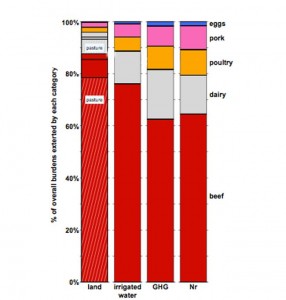 Bad news for beef lovers. Another study has shown that the most environmentally harmful animal in the American diet is beef. Compared to pork, poultry, or eggs in a per-calorie comparison, beef was worse in every measure – water, land, fertilizer. It’s useful information for those who are considering cutting meat from their diet for environmental reasons…a huge first step would be to just minimize how much beef and dairy you consume. There’s no way I’m cutting beef out of my diet entirely…I’m too much of a steak lover for that! Including more poultry and pork looks like a good move though.
Bad news for beef lovers. Another study has shown that the most environmentally harmful animal in the American diet is beef. Compared to pork, poultry, or eggs in a per-calorie comparison, beef was worse in every measure – water, land, fertilizer. It’s useful information for those who are considering cutting meat from their diet for environmental reasons…a huge first step would be to just minimize how much beef and dairy you consume. There’s no way I’m cutting beef out of my diet entirely…I’m too much of a steak lover for that! Including more poultry and pork looks like a good move though.
What the food industry is selling us
Ready to be grossed out about our food supply? Ok, here goes, thanks to this great article over at cracked.com (check it out for more juicy details…).
Do you like honey? Do you think it’s *really* honey? Think again. The common practice is to buy honey from China, which, let’s face it, has a reputation for reducing cost at expense of quality. When it comes to honey, that means stripping out the pollen (so its true source cannot be determined), and adding corn syrup and artificial sweeteners. Buy local if possible, to avoid this.
Soy sauce? Perhaps, but you’re just as likely to be eating flavored corn syrup and not even know it.
But hey, buying a whole, all natural chicken is ok, right? I mean, it’s just a chicken, nothing added, right? Yeah right, you wish. Ever hear of plumping? You probably don’t want to. It’s a process whereby the raw chicken meat is injected with saltwater, chicken stock, seaweed extract, or other mystery ingredients to make the meat tastier and juicier. We’re not talking about this being exclusive to ‘chicken nuggets’ and other processed mystery meat, no, this is done to whole chickens. This also has the benefit (to the corporations) of increasing profits, as prices are typically per pound, and you’re paying for 15-30% saltwater instead of chicken. Oh, and it still gets to wear its ‘all-natural’ label, because, even if it’s not all chicken, it’s all natural ingredients inside that wrapper. Nice, huh.
Then of course there’s meat glue, where they take the little scraps of meat that don’t form big enough pieces for steak and, well, they glue them together to make a steak.
Ok, so skip the chicken and beef and get some fish, right? How about some nice salmon? That pink color comes from the shrimp and krill they eat. Except the salmon you’re eating probably never had a single shrimp or krill in its life because most salmon consumed today (~95%) was raised on fish farms. Its meat ends up a gray color, but that doesn’t sell well…so they dye it pink. Hamburger and sausage is often dyed to a more pleasing red color as well (using a dye that causes cancer in mice…).
What about nice, yummy Kobe beef…is that any better? Ha! The rules that apply to Kobe beef production aren’t in compliance here…it’s basically illegal to produce Kobe beef. Even worse, there’s no regulation on the use of the term “Kobe beef” outside of Japan, so as long as it’s beef, hey, Kobe it is then! Chances are, unless you ate some in Japan, you’ve never, ever had Kobe beef.
How do you think olive oil is made? From olives, right? Yep! Well, that and sunflowers! While not legally accepted (people DO go to jail for this one), some extra virgin olive oils actually have been found to contain up to 80% sunflower oil (that’s only 20% olive oil!). It’s an industry that’s at least trying to get it right, but corruption and greed are making it tough. Your best bet is to get only ‘extra virgin’ oil, since others (like ‘light’) have been refined and are less natural. Don’t shop based on the color of the oil, it’s meaningless.
These are just a few disturbing examples of what are thought of as natural, basic foods – not heavily processed items like cheetos (let’s not even go there…). So, if you care about what you’re eating, what can you do? As you see, not a lot. However, you can start buy buying local…go direct to the source, where possible. Get a quarter of a grass fed cow delivered (clean out your freezer first!). Plant a garden. Avoid ‘status’ foods like Kobe Beef that are carrying a heavy marketing message.
Good luck!
